Pew: Democrats Increasingly Favor Government Censorship of ‘False’ Ideas

The Pew Research Center has released a survey showing that Democrats increasingly favor government censorship of “false information online.”
In just three years, the share of Democrats and Democratic leaners who support government censorship of information has risen a remarkable 25 points, from just 40 percent in 2018 to 65 percent today, Pew revealed this week.
A significant majority of Democrats now “say the government should take steps to restrict false information, even if it means limiting freedom of information,” Pew stated.
By contrast, Republicans and those who tend Republican have moved in the opposite direction during the same time period, creating a stark partisan divide in choosing between freedom of speech and government control.
While in 2018, 37 percent of Republicans favored government restrictions on the information flow (just 3 percent below Democrats at the time), today that number has fallen to just over a quarter (28 percent).
This means that Democrats’ support for government censorship is now more than double that of Republicans.
Both Democrats and Republicans prefer Big Tech censorship to government censorship, but even in this case, Republicans overwhelmingly favor freedom of expression to any censorship at all, while Democrats lean heavily in the opposite direction.
Pew found that among Democrats and those who lean Democrat, those who support tech companies restricting the free flow of information to filter out “false” ideas has risen from 60 percent to 76 percent in the past three years.
Among Republicans and those who lean Republican, on the other hand, the share of those who support tech censorship has dropped by 11 percent during the same period, from 48 percent in 2018 to just 37 percent today.

WASHINGTON, DC – OCTOBER 23: With an image of himself on a screen in the background, Facebook co-founder and CEO Mark Zuckerberg testifies before the House Financial Services Committee in the Rayburn House Office Building on Capitol Hill October 23, 2019 in Washington, DC. Zuckerberg testified about Facebook’s proposed cryptocurrency Libra, how his company will handle false and misleading information by political leaders during the 2020 campaign and how it handles its users’ data and privacy. (Photo by Chip Somodevilla/Getty Images)
This means that the partisan divide in the debate between Tech censorship vs. free speech has more than tripled over the past three years, from a split of 12 percent in 2018 to a gulf of 39 percent in 2021.
Numerous accounts suggest that the task of discerning “false” information from true data or mere opinion is fraught with difficulty and easily influenced by the subjective preconceptions of “fact-checkers.”
In his dystopian novel 1984, George Orwell famously referred to holding and sharing unacceptable opinions as “thoughtcrimes,” which were investigated and punished by “thought police.”
“The thought police would get him just the same,” Winston Smith reflects in the novel. “He had committed – would have committed, even if he had never set pen to paper – the essential crime that contained all others in itself. Thoughtcrime, they called it.”
“Thoughtcrime was not a thing that could be concealed forever,” he continued. “You might dodge successfully for a while, even for years, but sooner or later they were bound to get you.”
By clicking “Accept All Cookies”, you agree to the storing of cookies on your device to enhance site navigation, analyze site usage, and assist in our marketing efforts.





.
Please let us know if you're having issues with commenting.